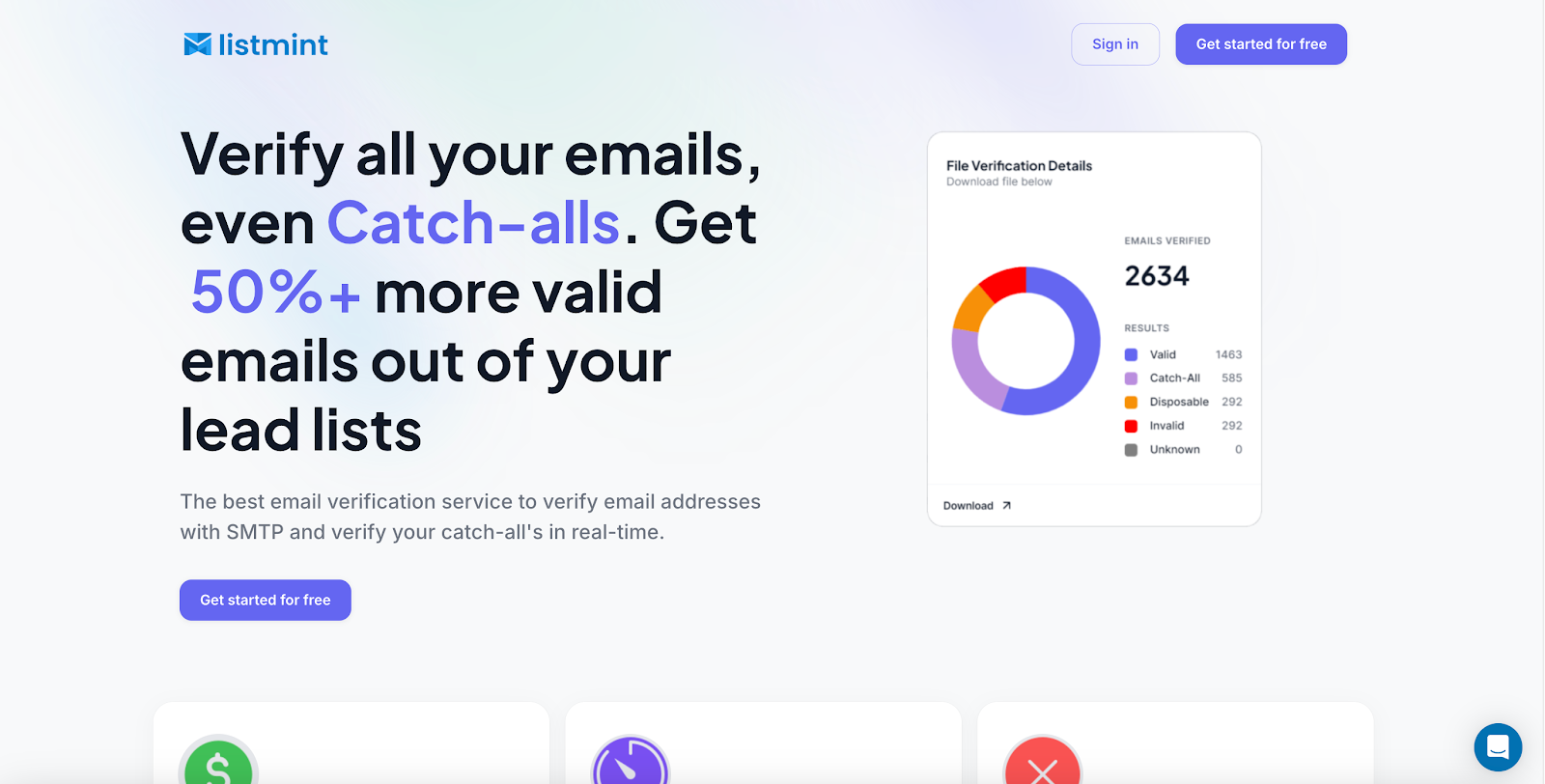
The quality of your email database determines whether your campaigns reach real people or waste time chasing invalid records. A single typo in an address can block a welcome message, reduce engagement, or even damage your sender's reputation.
Email validation API stops those problems before they spread. Instead of cleaning lists after the fact, you can confirm addresses the moment they enter a system.
That means fewer errors slipping into databases, stronger deliverability, and more reliable communication with customers.
In this guide, we’ll explain what a real-time email API is, how it works compared to other approaches, where it fits into modern workflows, and why many teams choose Listmint to keep their data accurate from the start.
A real-time email API is a tool that checks an address the instant it’s entered into a system. That means businesses capture cleaner data from the start and reduce the risk of sending messages to accounts that will never reach an inbox.
Real-time checks stand apart from manual reviews or periodic batch runs.
Traditional methods often allow invalid emails to sit in databases for weeks or months, leading to bounce issues and poor engagement. An API prevents those problems by acting immediately, rejecting or flagging any bad data before it has a chance to cause damage.
The process fits naturally into many existing data flows. It can be added to web forms, registration pages, CRMs, or import systems with a simple API call. Developers only need an API key to connect and start validating.
The results feed directly back into the database, helping teams keep customer information accurate without slowing down the user experience.
Understanding the difference between real-time checks and validation workflows helps teams decide how to protect data at every stage. Both approaches work together, but they serve different roles inside an email program.
A real-time API runs checks instantly at the point of capture. When a user types an address into a form, the API responds in seconds with a clear status. That makes it possible to block invalid inputs before they ever reach the database.
The result is fewer invalid emails in campaigns and more reliable communication with customers.
A validation API processes lists in bulk. Teams can upload a file, connect a CRM, or run a scheduled job to scan thousands of addresses at once. It helps identify disposable emails, spam traps, and other risky accounts already sitting inside systems.
Bulk validation is useful for ongoing list maintenance and for keeping older data fresh.
Get started with Listmint for free and gain access to its real-time email validation API.
A real-time email API fits naturally into different workflows where clean data makes a direct impact. The most common use cases include:
Each of these use cases helps protect databases and improve deliverability. Real-time checks keep teams focused on genuine customers, not invalid accounts, making every email campaign more effective.
An email API service connects directly to the systems that manage communication, making it easier to validate addresses and keep campaigns on track.
Instead of relying only on bulk checks, the service works in the background of existing workflows to confirm every entry before a message is sent.
Clean addresses support stronger email deliverability by reducing bounce rates and helping emails reach the inbox. Verified data helps improve open rates and click-through rates, especially for high-volume email campaigns.
Integration is straightforward for developers. An API key connects the service to registration forms, email servers, and customer systems.
You can build connections using common programming languages like PHP or by connecting through an external provider or email delivery platform.
Every single email address can be validated before a welcome email or other communication is sent, preventing wasted effort and keeping the mail experience consistent.
An email API service works as the foundation of an effective email program, helping you send more emails that matter and protect your databases over time.
Getting the most value out of a real-time API comes down to how it’s applied inside everyday workflows. A few best practices include:
These practices help teams maintain a stronger email program, protect their reputation, and make sure every campaign delivers emails that matter.
Choosing the right email real-time API comes down to accuracy, reliability, and usability. Teams need a service that delivers instant results without slowing down the process.
Accuracy matters most, especially on difficult domains like catch-alls. A strong API confirms the status of every address and provides clear outcomes such as valid, invalid, catch_all_valid, or catch_all_invalid. That clarity helps teams act immediately without second-guessing the data.
Low latency and high uptime keep operations smooth. Every request should return in seconds, even during heavy traffic. Service-level guarantees give confidence that the system will not fail during peak usage.
Developer experience also plays a role. Clean documentation, SDKs in common programming languages, and sandbox environments make integration simple. A single API key should be enough to connect, test, and go live.
Security and privacy cannot be overlooked. Look for encryption, scoped access, and clear data retention policies. Observability through logs, metrics, and webhooks adds visibility for ongoing monitoring.
Pricing should match usage. A scalable model allows small teams and large enterprises to adopt real-time verification without overspending.
Listmint stands out as one of the few email verification services that can instantly confirm catch-all addresses with proven accuracy.

While most tools leave 30–40% of lead lists marked as risky, Listmint verifies those records in real time, so teams get more value out of the data they already own. The result is stronger deliverability and less wasted effort on invalid emails.
The platform has already verified more than 1B emails with 99%+ accuracy across both standard and catch-all email addresses.

Unlike other providers that rely on slow, manual checks or send test messages, Listmint delivers immediate results without ever sending an email to the inbox.
Built for both direct users and resellers, Listmint supports B2B teams, agencies, and SaaS platforms. Business owners can clean lists through the platform, while developers integrate the API to power verification inside their own products.
Either way, real-time verification makes sure every new address is validated before it impacts campaigns or customer communication.
Key features of Listmint:
Listmint makes real-time email verification practical for both small businesses and enterprise platforms. Teams avoid wasted leads, protect sender reputation, and increase response rates by verifying every type of address before messages are sent.

Keeping email data accurate is no longer optional. Real-time verification gives businesses the control to stop bad records before they affect campaigns, customers, or reputation. With instant checks in place, every new address entering the system is ready to support meaningful communication.
Listmint makes this process fast, reliable, and simple to use. It combines proven accuracy with real-time results, and it helps teams focus on growth instead of chasing invalid contacts.
Try Listmint’s email real-time API with a free account and see the difference for yourself.
An email API is a tool that connects applications to email systems so they can send, receive, or validate addresses automatically. Businesses often use it with an email verification api to keep databases clean and protect campaigns.
Google offers APIs that allow developers to access Gmail features. Some basic usage is free, but higher volumes or advanced features may require billing. These APIs can retrieve email data, manage email messages, and support integrations.
Real-time email refers to immediate validation or delivery processes. For example, a real-time API can confirm if an address is valid using SMTP checks before a message is sent. This prevents invalid contacts from entering the system.
Yes. The Gmail API lets developers post and send emails directly through a user’s account once permission is granted. It’s often used in apps that need to deliver emails or manage communication at scale.
A bulk validation tool cleans up large email lists after they are collected, but it cannot stop bad records at the point of entry. An email real-time API checks each address instantly, blocking invalid or fake sign-ups before they ever reach the database.
Using both together gives the strongest protection for data accuracy and email deliverability.
Verify all your emails, even Catch-alls in real-time with our Email Verification Software.
Create an account for free.